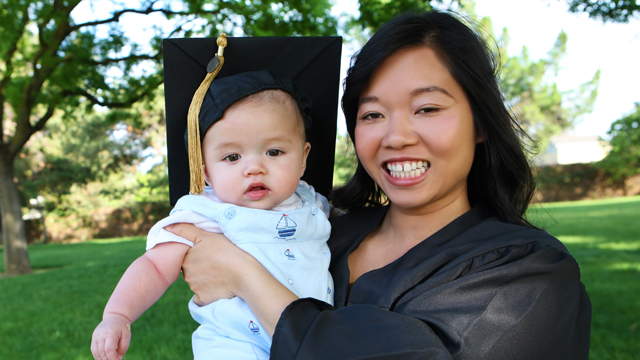
How do you feel about letting a 6-month-old baby cry it out at night until she gets back to sleep? She has been sleeping through the night for a few months, but lately has started waking up.

It is not unusual for a baby who has excellent sleeping habits to go through a period, or periods, of sleep disturbance. There are a variety of reasons for this sleep regression. It could be a change in routine. Review your schedule and your baby’s recent developments to notice if anything has changed. It could be something as simple as bath time being moved up a few hours. Is your baby teething? Painful experiences with teething could cause a sleep disturbance, as it would with anyone. Or is the baby doing something new – crawling, sitting up, rolling over? It is very common for a new developmental milestone to affect sleep. Is your baby eating enough for her weight? Could she be hungry? Growth spurts are common.
I have to point out that like many moments in parenting, there may be no clear reason for this new behavior. If you are able to pinpoint the reason for the change, try to adjust her routine and know that most sleep disturbances last an average of one week. If you can’t identify the culprit, don’t worry, as there are still options for you. Patience can come easier in the wee hours of the morning if you know the reason why, but regardless, your daughter is sending the message that something is out of sorts for her, and she needs your help.
I would suggest that you do not introduce any new sleep strategies such as picking her up or rocking her during this disruption. Your baby knows how to sleep; she just needs help staying asleep right now. You can check on her to make sure there is nothing she needs, like a new diaper or a heavier sleeper if she is cold. After you determine she is physically okay, I recommend checking on her, but leave her in the crib and see if she can fall back asleep on her own. You could rub her back for a few seconds so she knows you are there. Try not to turn on any lights or create a distraction. You can lengthen the duration between checks by short increments of two or three minutes. Short periods of crying will not harm her.
I recommend checking on her, but ultimately, remember that her solid sleep habits will help her progress through this phase, and allow everyone to get back to a full night of uninterrupted sleep.

Our daughter is leaving for college this month, and she has never had a beer – or any kind of alcohol. A friend suggested letting her have a few drinks at home one night, just so she’s aware of how it feels. What are your thoughts on this strategy?

I am assuming your daughter is around eighteen years old and therefore, is not of legal drinking age. It is fine for your expectation and your daughter’s expectation to be that she doesn’t drink alcoholic beverages until she is of legal age. She will not be the only person at college who is not consuming alcohol. If the strategy proposed by your friend is so your daughter can adjust to drinking, you are stating that you are comfortable with her drinking and expect that she will drink at college. A different approach may be to talk honestly about safe decision-making skills for many situations that she will encounter at college, not just those related to alcohol.
I think there is a lot you can do to help prepare your daughter for this next phase in her life. Ask her what she thinks about alcohol and college? She may be excited about finally being able to drink without the worry of being caught, or she may not have any interest in drinking alcohol at this point in her life. Delve deeper into her responses. Talk about this in a non-judgmental tone to help her prepare for certain situations. Discuss strategies of what to do when she is offered drinks. Talk to her about different scenarios, and how she can be safe in a variety of situations. Reach out to her college and find out their safety services. Do they have campus security or a safe-ride system for late-night walks back to the dorm? Is there a resident advisor in every dorm who she could check in with if there are any problems?
Remember the buddy system on field trips during elementary school? I highly recommend this set-up for all college students. Encourage her to go places with friends she trusts and knows will look out for her. Recommend that she always tell a friend who she is with and where she is going to be. Sexual assaults are high on college campuses, and alcohol often plays a role. Most orientation sessions held during the first few days of school answer these questions. As the first semester unfolds, continue to talk with her about the choices she is making, and how easy it is to be swayed by peer pressure, even when you are an adult.
Educate your daughter on how alcohol can impair her judgment. Talk to her about how alcohol impacts decision-making skills, and that while she adjusts to this significant time of freedom and exploration, introducing alcohol may not be the best decision.
Helping your daughter become aware of the effects of alcohol is not something I would recommend. Instead, I would focus on helping her feel empowered and confident in a variety of situations so she can make good decisions while she is away at college.




